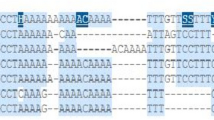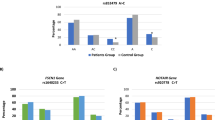Abstract
Background
Assuming an association between cancer and metabolism, oncogene-directed metabolic reprogramming in cancer has revealed new target strategies. For example, the LKB1-AMPK-mTOR signaling pathway genes are already known to alter the cell metabolism and to play a critical role in the malignant behavior of cancer. Accordingly, based on the assumption that genetic variations in the LKB1-AMPK-mTOR signaling pathway can change the intracellular signal in terms of metabolic reprogramming, the present study analyzed 18 single nucleotide polymorphisms (SNPs) of the STK11, PRKAA1, TSC1/2, and mTOR genes and their impact on the survival of patients with colorectal cancer.
Methods
Seven hundred seventy-two patients with surgically resected colorectal adenocarcinoma were enrolled in the present study. Eighteen SNPs were selected from an in silico analysis based on previous evidence of association. The SNP genotyping was performed using a SEQUENOM MassARRAY.
Results
Among the 18 polymorphisms, three SNPs (STK11 rs741765, PRKAA1 rs461404, and TSC1 rs13295634) were significantly associated with disease-free survival (DFS) or overall survival (OS). In a multivariate analysis, the GG genotype of STK11, TT genotype of PRKAA1, and TG or GG genotype of TSC1 were identified as independent prognostic factors for a worse DFS (hazard ratio = 1.398, 1.408, and 1.388; p = 0.030, 0.013, and 0.002, respectively) and OS (hazard ratio = 1.431, 1.680, and 1.394; p = 0.038, 0.001, and 0.009, respectively).
Conclusions
The present results suggest that genetic variants of the STK11, PRKAA1, and TSC1 genes could be used as prognostic biomarkers for patients with surgically resected colorectal cancer.

Similar content being viewed by others
REFERENCES
Hagland HR, Berg M, Jolma IW, Carlsen A, Soreide K. Molecular pathways and cellular metabolism in colorectal cancer. Dig Surg. 2013;30:12–25.
Ward PS, Thompson CB. Metabolic reprogramming: a cancer hallmark even warburg did not anticipate. Cancer Cell. 2012;21:297–308.
Slattery ML, Murtaugh M, Caan B, Ma KN, Neuhausen S, Samowitz W. Energy balance, insulin-related genes and risk of colon and rectal cancer. Int J Cancer. 2005;115:148–54.
Shackelford DB, Shaw RJ. The LKB1-AMPK pathway: metabolism and growth control in tumour suppression. Nat Rev Cancer. 2009;9:563–75.
Green AS, Chapuis N, Lacombe C, Mayeux P, Bouscary D, Tamburini J. LKB1/AMPK/mTOR signaling pathway in hematological malignancies: from metabolism to cancer cell biology. Cell Cycle. 2011;10:2115–20.
Han D, Li SJ, Zhu YT, Liu L, Li MX. LKB1/AMPK/mTOR signaling pathway in non-small-cell lung cancer. Asian Pac J Cancer Prev. 2013;14:4033–9.
Slattery ML, Herrick JS, Lundgreen A, Fitzpatrick FA, Curtin K, Wolff RK. Genetic variation in a metabolic signaling pathway and colon and rectal cancer risk: mTOR, PTEN, STK11, RPKAA1, PRKAG2, TSC1, TSC2, PI3 K and Akt1. Carcinogenesis. 2010;31:1604–11.
Slattery ML, Fitzpatrick FA. Convergence of hormones, inflammation, and energy-related factors: a novel pathway of cancer etiology. Cancer Prev Res (Phila). 2009;2:922–30.
Shaw RJ, Kosmatka M, Bardeesy N, et al. The tumor suppressor LKB1 kinase directly activates AMP-activated kinase and regulates apoptosis in response to energy stress. Proc Natl Acad Sci USA. 2004;101:3329–35.
Engelman JA. Targeting PI3 K signalling in cancer: opportunities, challenges and limitations. Nat Rev Cancer. 2009;9:550–62.
Keshavarz P, Inoue H, Nakamura N, Yoshikawa T, Tanahashi T, Itakura M. Single nucleotide polymorphisms in genes encoding LKB1 (STK11), TORC2 (CRTC2) and AMPK alpha2-subunit (PRKAA2) and risk of type 2 diabetes. Mol Genet Metab. 2008;93:200–9.
Carling D. The AMP-activated protein kinase cascade: a unifying system for energy control. Trends Biochem Sci. 2004;29:18–24.
Bassols J, Megia A, Soriano-Rodriguez P, et al. A common gene variant in STK11 is associated with metabolic risk markers and diabetes during gestation. Fertil Steril. 2013;100:788–92.
Cook WD, McCaw BJ. Accommodating haploinsufficient tumor suppressor genes in Knudson’s model. Oncogene. 2000;19:3434–8.
Hardie DG. The AMP-activated protein kinase pathway: new players upstream and downstream. J Cell Sci. 2004;117(Pt. 23):5479–87.
Hardie DG. AMP-activated/SNF1 protein kinases: conserved guardians of cellular energy. Nat Rev Mol Cell Biol. 2007;8:774–85.
Shaw RJ, Cantley LC. Ras, PI(3)K and mTOR signalling controls tumour cell growth. Nature. 2006;441:424–30.
Mak BC, Takemaru K, Kenerson HL, Moon RT, Yeung RS. The tuberin-hamartin complex negatively regulates beta-catenin signaling activity. J Biol Chem. 2003;278:5947–51.
Inoki K, Zhu T, Guan KL. TSC2 mediates cellular energy response to control cell growth and survival. Cell. 2003;115:577–90.
Lee DF, Kuo HP, Chen CT, et al. IKK beta suppression of TSC1 links inflammation and tumor angiogenesis via the mTOR pathway. Cell. 2007;130:440–55.
Acknowledgment
This work was supported in part by a National Research Foundation of Korea Grant funded by the Korean Government (NRF-2011-0015862) and in part by a Grant from the Korea Health Technology R&D Project, Ministry of Health & Welfare, Republic of Korea (A111345).
Conflict of interest
The authors declare they have no conflict of interest to disclose.
Author information
Authors and Affiliations
Corresponding author
Electronic supplementary material
Below is the link to the electronic supplementary material.
Rights and permissions
About this article
Cite this article
Lee, S.J., Kang, B.W., Chae, Y.S. et al. Genetic Variations in STK11, PRKAA1, and TSC1 Associated with Prognosis for Patients with Colorectal Cancer. Ann Surg Oncol 21 (Suppl 4), 634–639 (2014). https://doi.org/10.1245/s10434-014-3729-z
Received:
Published:
Issue Date:
DOI: https://doi.org/10.1245/s10434-014-3729-z




